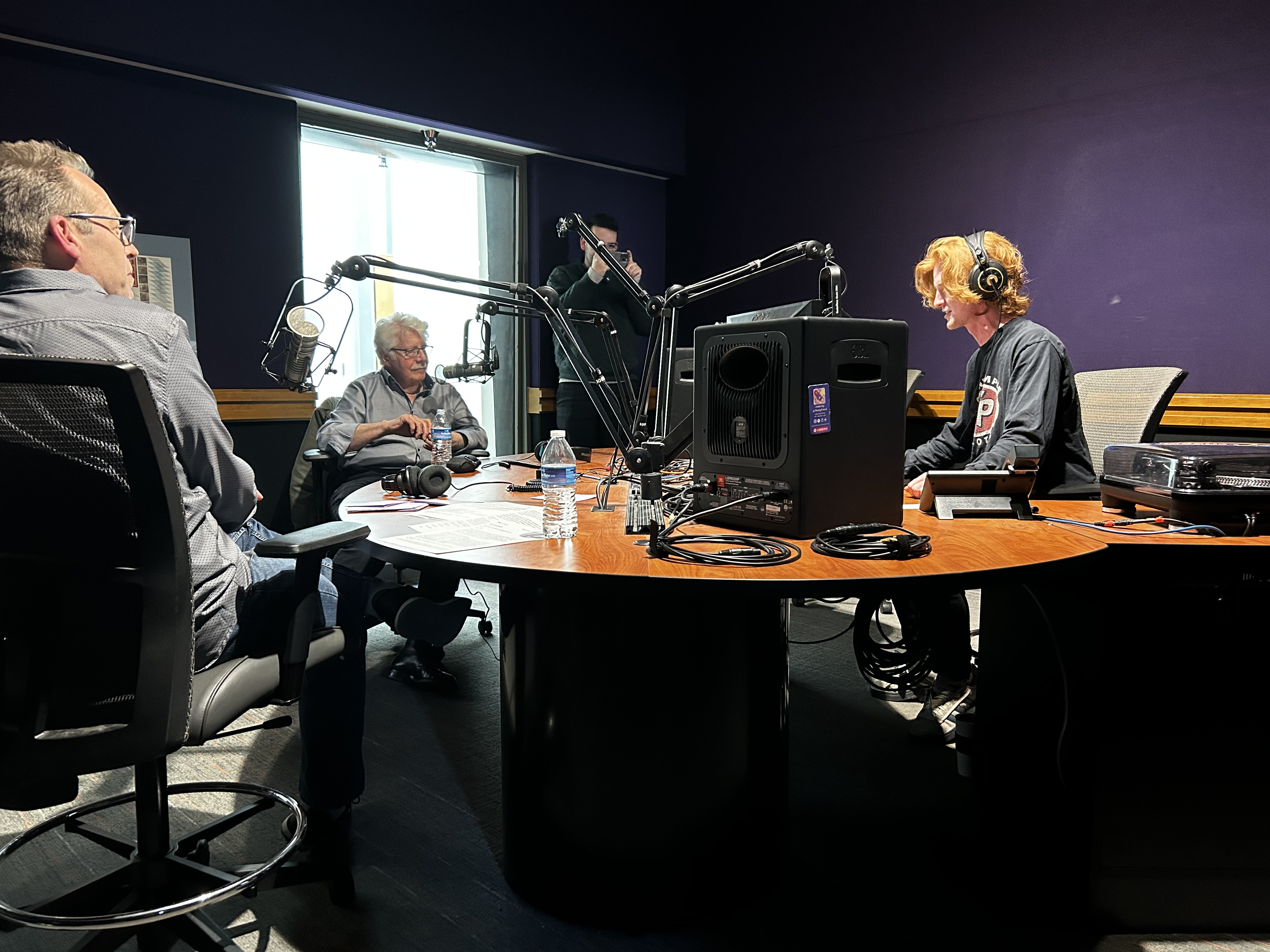In the early 1960s, Columbus residents could hear Capital University’s radio station on the airwaves in their homes and cars. WXCU was a traditional small broadcast station with its own tower and an expensive license, a model the university maintained until the early 2000s.
With the arrival of streaming media, WXCU transitioned online. Listeners can tune in at WXCURadio.com, but many people enjoy the station as the soundtrack of the Convergent Media Center, where the station is played every day in the common areas. Within the same hour, you might hear ’90s alternative band the Smashing Pumpkins, experimental musician Oneohtrix Point Never collaborating with Iggy Pop, and Johnny Cash singing “A Boy Named Sue.”
What you won’t hear, according to a recent WXCU advertisement, is Miley Cyrus.
Like CapTV and the Capital Sports Network, WXCU operates as a pre-professional class designed to be a hands-on, student-driven experience. These classes help students develop the professional skills and knowledge that people working in media need.
The current version of the radio station is helmed by Assistant Professor Sabrina Evans-Renkar of the Film and Media Department.
“When I came to Capital in 2022, the radio station had been kind of abandoned,” Evans-Renkar said. “It had been sort of run on autopilot, and COVID destroyed its ability to function as an on-campus hub.”
Evans-Renkar did not have substantial experience in radio, despite working on her college radio station “a hot minute ago.” The focus of her career has been documentary filmmaking, audio documentaries, and narrative cinema.
“They needed somebody to dive in and do something with it,” Evans-Renkar said, “and, you know, I love a project. I’m a lifelong NPR listener, and I was actually thrilled at the opportunity to try something a little different. It’s one of the things that fell in my lap, and it ended up being one of my great joys working here.”
For a brief time during the transition, antiquated gear and technology prevented the station from being heard anywhere outside the CMC, but this obstacle turned into a benefit.
“We had this beautiful studio, this great radio station with windows, where the students were broadcasting to their peers in the CMC,” Evans-Renkar said. “We were able to begin to get this sense of speaking to an audience, building a connection. We started very small with this notion of communication, building audience-influenced programming.”
Once issues with the stream were resolved, the team brainstormed about future goals for the station. They decided to focus on growing their on-campus presence by scheduling events and giveaways. This culminated in WXCU Day in spring 2024, a big concert on the university lawn. This year’s event was canceled due to weather, but it will return next year.
As the station’s personality develops, they are tackling more diverse broadcasting projects. The Live and Up Front Concert series, launched in spring 2025, is a live music broadcast inspired by NPR’s Tiny Desk concerts. Musicians come in to perform a 20-minute set and then sit for an on-air interview. Their first few sessions have focused on bands created by Capital students, as well as a high school punk band from Granville, Ohio.
To do this, WXCU collaborates with the university’s television channel, CapTV.
“We have the bands playing in the TV studio and a piece of equipment that runs the signal down to the audio studio,” Evans-Renkar said. “Someone mixes it, then the signal pings right back up to the radio station where we have a DJ running it live.”
One big project of the year involved superstar music producer Ken Scott, the keynote speaker of the Sound and Media Workshop. WXCU brought in WCBE’s Mike Foley to interview Scott live on air while students sent in questions. This allowed radio students to see Foley at work while learning from Scott’s experiences.
This project was so successful that they plan to incorporate it into all Sound and Media Workshop events going forward.
Over time, Evans-Renkar hopes to include even more aspects of the Film and Media Department in the programming of WXCU. They are considering interview projects, radio journalism, audio documentaries, live concert reviews, and collaborations with the Chimes, Capital’s student newspaper.
“We have students who are doing these audio pieces that don’t have a home, and some of them are just really, really good,” Evans-Renkar said. “This medium can lend itself to so many different avenues of human experience, from a singer-songwriter to a local business to someone telling their story.”
For music tech major Malorie Nauman, the radio station acts as both a professional training and a medium for self-expression. She has dedicated time to the radio every semester, building creative playlists and sharing them on air. Her latest playlist features “noisy, lo-fi, and DIY indie-type genres.”
“The main thing that keeps bringing me back to WXCU is the concept of sharing music I love with other people,” Nauman said. “Whenever someone says they discovered a new song that they liked from listening to my radio show, I feel like I’ve shared a piece of myself in a way.”
“We’re up against everybody’s Spotify account,” Evans-Renkar said. “We’re up against people who just throw on the mix and let it play out. But as a DJ, you are the thing that’s different. You’re the voice that’s not been heard before.”
Nauman also credits her experience at WXCU with supporting her personal development.
“WXCU has helped me build my speaking confidence greatly,” she said. “As a trans woman who hasn’t done voice training yet, I still feel a lot of dysphoria from my speaking voice. Talking on air has allowed me to speak out more comfortably.”
While her initial involvement was born of necessity, Evans-Renkar is now fully committed to WXCU’s growth and success.
“We’re not going away. This is something that I really want to grow. I see a real future for our program, for our students.”
